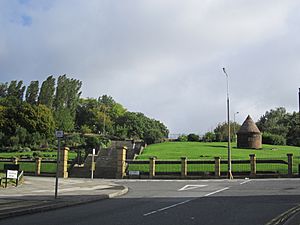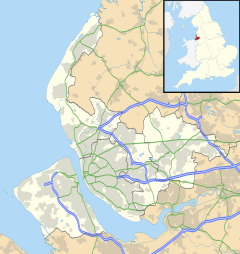Everton, Liverpool facts for kids
Quick facts for kids Everton |
|
|---|---|
 Everton Brow, with Everton Lock-Up visible |
|
| Population | 14,782 (2011 Census) |
| OS grid reference | SJ358917 |
| Metropolitan borough | |
| Metropolitan county | |
| Region | |
| Country | England |
| Sovereign state | United Kingdom |
| Post town | LIVERPOOL |
| Postcode district | L3, L5, L6 |
| Dialling code | 0151 |
| Police | Merseyside |
| Fire | Merseyside |
| Ambulance | North West |
| EU Parliament | North West England |
| UK Parliament |
|
Everton is a district in the northern part of Liverpool, England. It is part of the Liverpool Walton area. Everton is next to Vauxhall to the west, Kirkdale to the north, and Anfield to the north-east. In 2011, about 14,782 people lived there.
Contents
What's in a Name? The Story of Everton
The name Everton comes from an old Saxon word, eofor. This word means a wild boar that lives in forests. So, Everton might have meant "boar's farm" or "boar's town."
Some historians have a different idea. They thought the name came from 'Hiretun', which means "higher-town." This makes sense because Everton is on a hill. People used to call it 'Yerton', which could be a shorter way of saying "higher-town" or "over-town."
Everton's Journey Through Time
Everton is a very old place. For many years, it was a small farming village. In 1327, only about 95 people lived there. By the early 1700s, the population was still small, around 140 people. Most people were farmers. Sometimes, richer families would move to Everton to live a quiet life away from busy cities.
Growing with Liverpool
By the late 1700s, nearby Liverpool became very rich. Wealthy merchants from Liverpool started to build homes in Everton. This made Everton's population grow a lot. By 1811, over 900 people lived there. Many of these new residents were rich merchants. They were even called "Everton nobles" because they were so wealthy and important.
One important person was James Atherton. He was a Liverpool merchant who bought a lot of land in Everton. He built many beautiful streets and houses. He also gave land for St. George’s Church to be built. James Atherton also founded the seaside town of New Brighton.
The Old Beacon Tower
Before St. George's Church was built, there was a famous landmark called the Everton beacon. It was a small, square tower made of red sandstone. The tower was about 25 feet tall. It had a kitchen on the ground floor and a room for a guard above. The roof was flat, where a fire would be lit to guide ships or warn people.
The beacon offered amazing views for many miles. Over time, the tower became old and broken. In 1803, during a storm, the beacon collapsed. Some people think it might have been pulled down on purpose. During the English Civil War, people even got married at the beacon!
Becoming Part of Liverpool
As Liverpool grew, it needed more homes. Everton started to be built up with many houses. By 1829, about 3,763 people lived there. Everton officially became part of Liverpool in 1835. It changed from a quiet suburb to a busy part of the city.
Many Irish people moved to Everton and the nearby area of Vauxhall. This led to some disagreements between different religious groups.
In the 1960s and 1970s, many old buildings were torn down. A large green space called Everton Park was created. This changed the look of Everton a lot. The population also dropped by over 100,000 people since the 1960s.
New Beginnings
In 2017, a new shopping area opened on Great Homer Street. This project, called 'Project Jennifer', aimed to bring new life to Everton. It included a new Sainbury's supermarket and a revamped market. The NSPCC Hargreaves Centre, a place for children and families, also opened in 2007.
Famous Faces from Everton
Many interesting people have lived in Everton:
- James Atherton – A merchant who helped build up Everton and founded New Brighton.
- Thomas de Quincey – A writer from the 1800s.
- Paul McCartney – A famous musician from The Beatles.
- Prince Rupert of the Rhine – A soldier and royal prince.
- Robert Tressell – An author.
Important Places to See
- Everton Lock-Up – An old building, also known as Prince Rupert's Tower.
- Everton Road drill hall – A historic building used by soldiers.
- Everton water tower – A tall water tower built in 1864.
- St George's Church, Everton – A beautiful church.
- Everton Library – A local library.
Everton and Football
The famous football club Everton F.C. is named after this area. The club was first called St. Domingo F.C. because they started near St. Domingo Methodist Chapel in Everton. The Everton Lock-Up (Prince Rupert's Tower) is even on the club's crest! A local sweet company made 'Everton Mints' to honor the football club.
It's interesting that Everton F.C. has never actually played its home games in Everton itself. Their first few homes were in Anfield, and since 1892, they have played at Goodison Park in the Walton area. Also, Everton Cemetery is not in Everton; it's further north in Fazakerley.
The football club Liverpool F.C. also has a connection to Everton. It was first founded as 'Everton Football Club and Athletic Ground Company, Ltd' in 1892. This happened after Everton F.C. moved to Goodison Park. The people who started this new club later renamed it 'Liverpool F.C.'.
Schools in Everton
- Beacon Church of England Primary
- Notre Dame Catholic College
- Our Lady Immaculate Catholic Primary
- Whitefield Primary School
Images for kids
 | Claudette Colvin |
 | Myrlie Evers-Williams |
 | Alberta Odell Jones |






